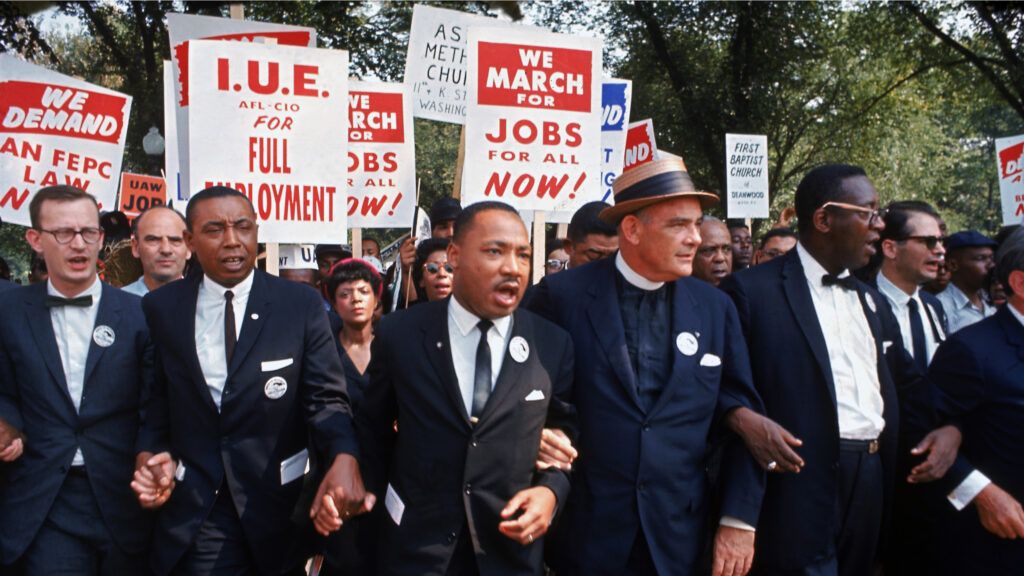This year marks the 50th anniversary of the assassination of Rev. Dr. Martin Luther King, Jr. The civil rights icon and pastor’s legacy of revolutionary love in the face of hate continues today in the hearts and actions of people around the world. In a world where bigotries still thrive, faith communities used the commemoration of Dr. King’s life to rededicate themselves to the work and ministry that Dr. King professed.
Churches around the country held concerts and conversations to mark the anniversary and to discuss the future of Dr. King’s work. In New York City Middle Collegiate Church, pastored by Rev. Dr. Jacqui Lewis, hosted its annual Revolutionary Love: Complete the Dream Conference in honor of Dr. King’s memory and to teach others how to they can love in the face of hate like Dr. King. Here are 4 takeaways from the conference:
1) Love society’s “others.”
Dr. King practiced nonviolence and showed love to those who opposed him, but he also had a deep and abiding love for his people, those who were marginalized by race, including those who lived in poverty. The organizing, marching, protesting and advocacy work that he did for racial equity and economic justice for Black Americans was driven by that deep love. Middle Church pastor Dr. Jacqui Lewis recommended understanding the roots of Christianity as a way toward loving those seen as the “others” in society. “Christianity begins in ‘otherness,'” she said at the conference. “Jesus was born a brown, Palestinian, poor, Jewish baby living in oppression under the Roman Empire.” She says, “If we don’t start there [understanding that Jesus was an outsider], we don’t end in love.”
2) Get a “Mountaintop Consciousness”
The last speech Dr. King made before he was assasinated is often called “The Mountaintop Speech.” In the prescient speech, Dr. King says that God had allowed him to climb the mountain [of racism and oppression] and look over it, and see the Promised Land and the “glory of the coming of the Lord.” In that spirit, human rights advocate Ruby Sales encouraged conference goers to move to a “mountaintop consciousness,” which sets your sights on God’s higher consciousness. She quotes the Psalmist when she says the prayer, “Give me a clean heart and renew a right spirit in me.” “That’s a call to action,” she says.
3) Love as a spiritual discipline.
Dr. King’s love wasn’t just a feeling of good will toward others, it manifested in action on behalf of those in need. To love like Dr. King, Dr. Simran Jeet Singh, professor of religion at Trinity University, says that our heart must be in our hands and feet so that our feelings of love turn into actual deeds. “You don’t wake up fighting hate with love,” he says. “It’s a spiritual practice. It’s about curating your ethical self on a daily basis.” He explains the spiritual discipline of anti-racism, for example, as “a commitment to educate ourselves on the issues of the oppressed.” This can be hard. Still, Dr. Singh says, “We’re not given the language, we have to learn the language. Enter into a spiritual space and talk about things honestly. Read often! With daily work and engagement, loving like Dr. King becomes a part of who you are and how you practice your faith.
4) Prioritize self love.
Dr. King wasn’t just fighting for other people; he fought for himself too, and risked his life for many years to do so. As school teacher and community activist Debbie Almontaser says, “You don’t tell yourselves enough, ‘you are great, you have a purpose.'” Encouraging yourself and showing yourself love is necessary in a world that may tell you that you’re unworthy of good things, that you don’t deserve love. Remembering that you are made in God’s image and that God loves you empowers you to continue to fight for love not only for yourself, but for a better, loving, just world for everyone. As you relinquish judgment over yourself, you can more easily recognize the humanity of others and relinquish judgment over them as well.






